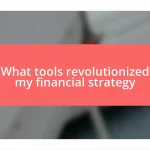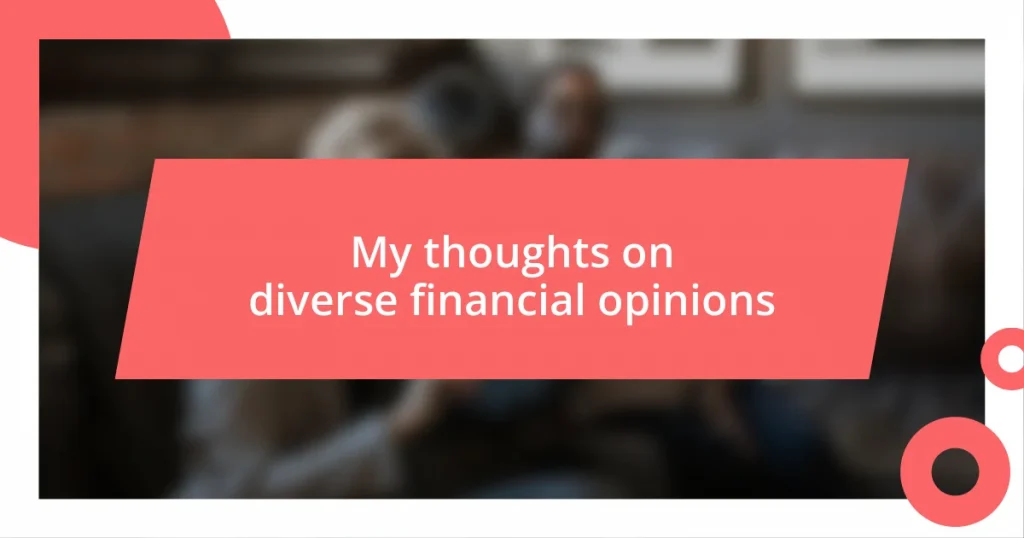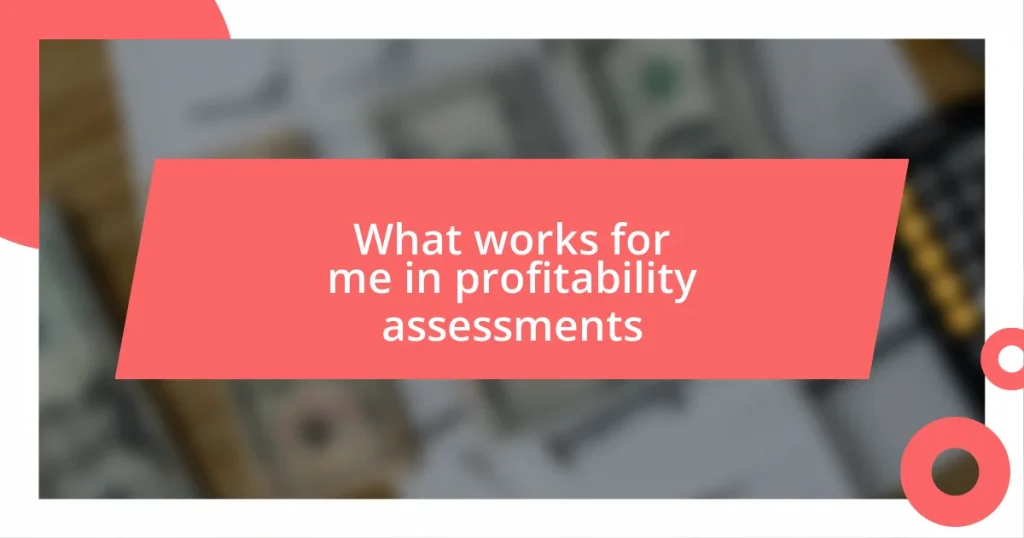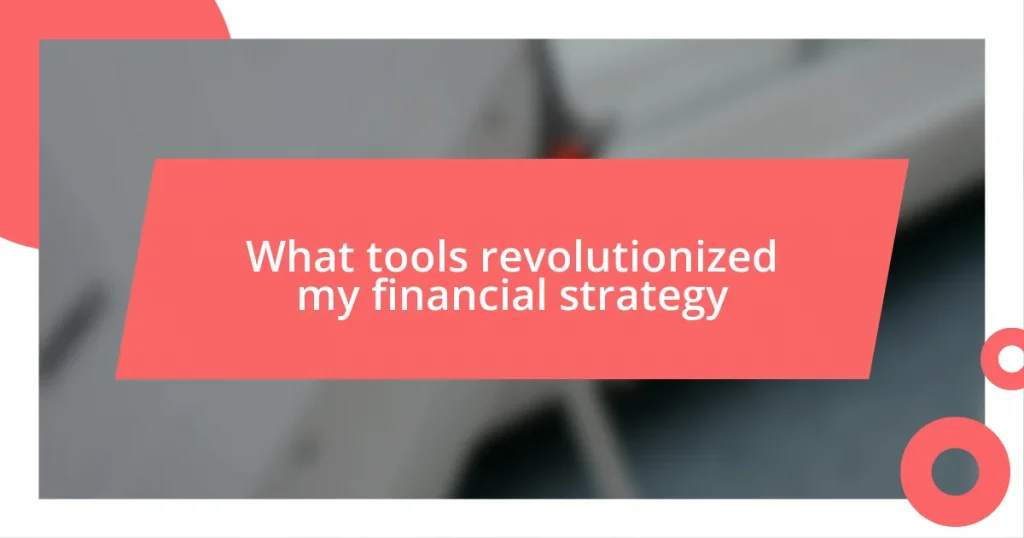Key takeaways:
- Diverse financial opinions enhance understanding, but require critical analysis to align strategies with personal values and circumstances.
- Engaging with a variety of financial viewpoints fosters innovative solutions and teaches empathy for differing financial journeys.
- Practical strategies, such as simplifying complex topics and creating decision-making frameworks, help in making informed financial choices.
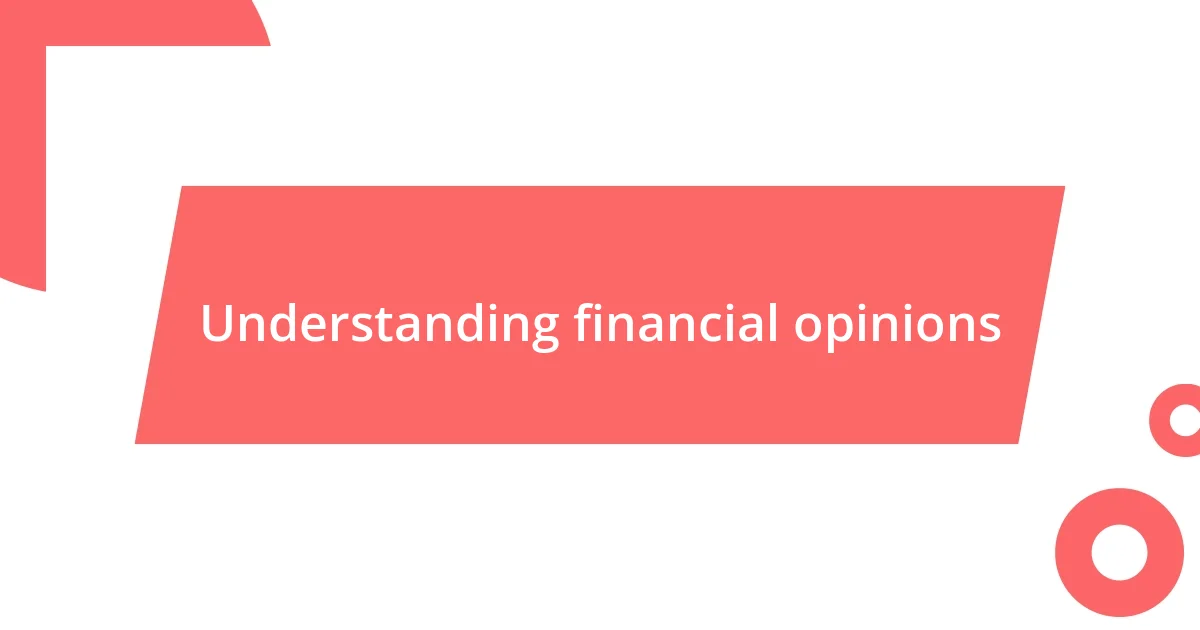
Understanding financial opinions
Understanding financial opinions can be quite a journey, sometimes akin to navigating a maze. I remember when I first dived into investing; I was overwhelmed by the myriad of voices echoing different strategies. Each opinion seemed to stem from personal experiences, shaping their perspectives, which made me wonder—how much of our financial beliefs are rooted in individual stories versus facts?
Exploring diverse financial opinions opens the door to a wealth of perspectives, but it also invites confusion. I often found myself caught between the fervent advocates of aggressive investing and the cautious savers who swore by slow and steady. This left me questioning my choices: should I follow the crowd or trust my instincts? It’s a dance of balancing insights while remaining true to my financial goals.
In my experience, understanding financial opinions is about filtering advice through the lens of one’s own values and circumstances. I recall a friend who invested heavily in tech stocks based on market trends but ultimately faced a steep loss when the bubble burst. His journey taught me the importance of critically analyzing opinions—what works for one might not suit another. How do you sift through the noise, then? It boils down to knowing your unique financial landscape and making informed decisions that resonate with your personal vision.
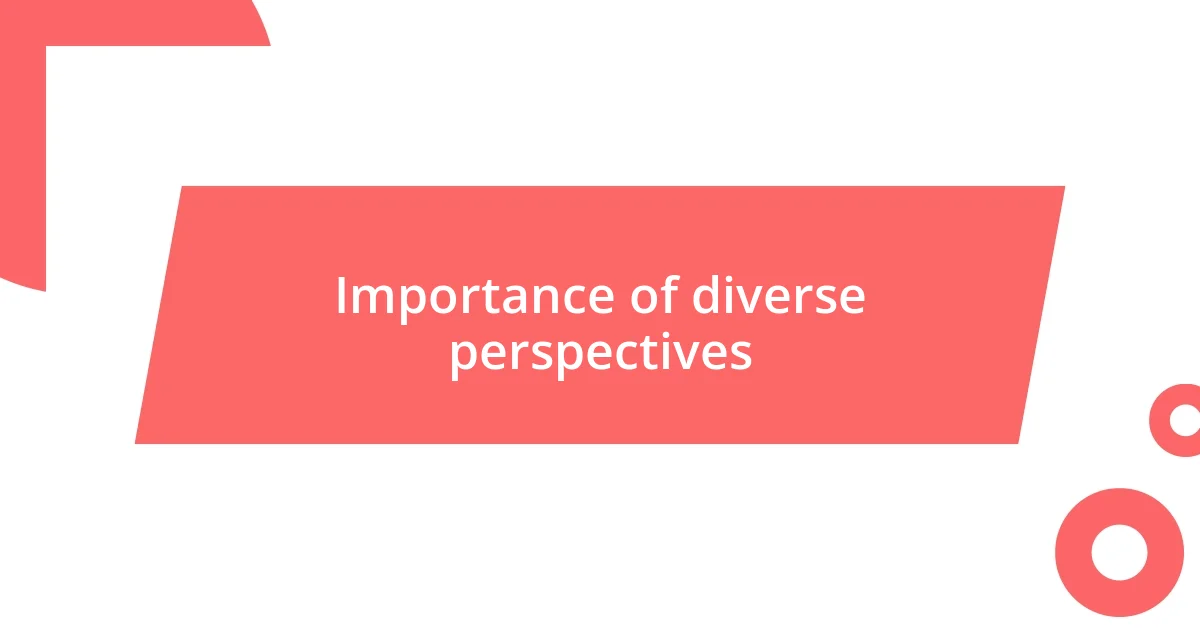
Importance of diverse perspectives
Diverse perspectives in financial opinions are crucial for building a holistic understanding of any investment scenario. From my observations, when I engaged with a community of investors, it became evident that each person brought unique experiences that illuminated aspects of finances I had never considered. I remember chatting with a retiree who shared wisdom about sustaining wealth over decades—her stories added layers of understanding to my perception of financial security.
- They introduce fresh ideas, challenging the status quo.
- Perspectives from diverse backgrounds enrich discussions and decision-making.
- Real-life experiences often highlight unseen opportunities or risks.
- They teach us empathy, helping understand varied financial journeys.
- Embracing differences can lead to innovative solutions and strategies.
Engaging with a range of opinions has taught me that no single approach is universally applicable. Once, while contemplating a significant purchase, I sought out the advice of friends with radically different financial strategies. Their input illuminated options I hadn’t thought possible, reshaping my approach and instilling confidence in my final decision. By embracing these diverse views, I not only made better choices but felt a deeper connection to the broader narratives woven into our financial lives.
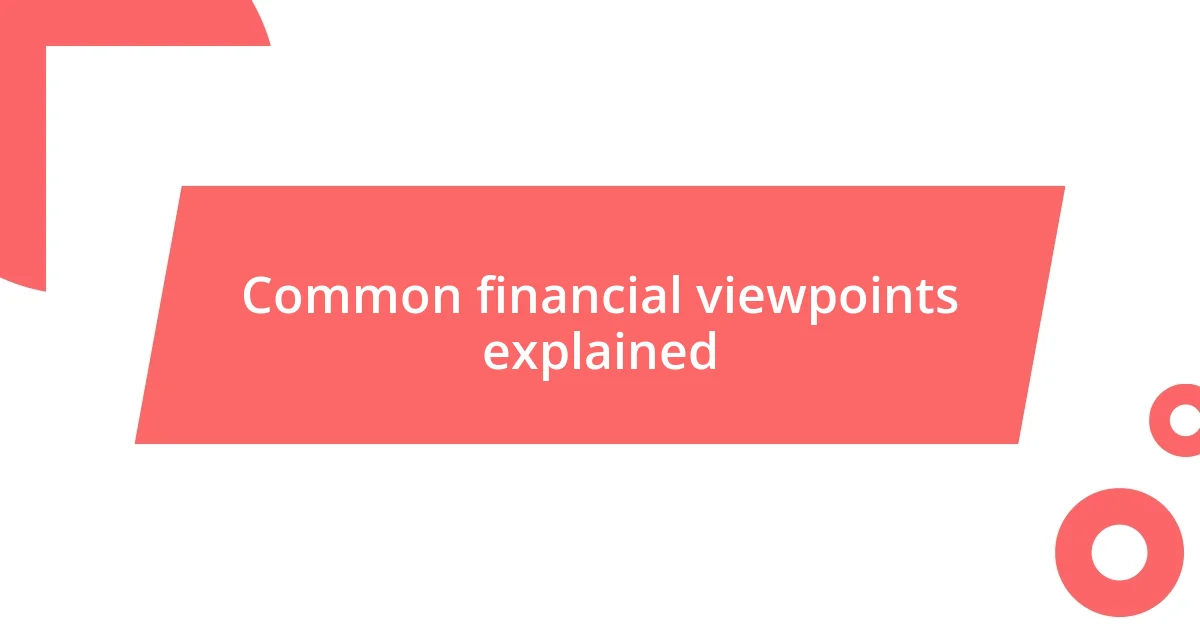
Common financial viewpoints explained
When it comes to common financial viewpoints, the contrast between budgeting versus investing often sparks intense debate. Some people swear by strict budgeting, insisting it’s the key to financial wellness. I used to believe that tracking every expense was essential until I spoke with a colleague whose wealth multiplied through strategic investments. He shared his journey of letting money work for him while allowing some wiggle room for enjoyment! That conversation broadened my perspective—it’s not just about what you save, but also about how you make your money grow.
Another viewpoint that surfaces regularly is the difference between aggressive growth strategies and conservative approaches. I remember attending a workshop where a passionate investor advocated for high-risk stocks, while another participant calmly discussed the merits of low-risk bonds. I left that day feeling both excited and overwhelmed. It made me realize that both strategies have validity depending on one’s risk tolerance and financial goals. Ultimately, it’s about finding the right balance for your personality and circumstances.
Finally, the discussion about debt can elicit strong feelings. Some argue that all debt is bad, whereas others view certain debts, like mortgages or student loans, as valuable investments. I found myself in a similar position when I took out a loan for my first car. Initially, I felt this weight on my shoulders, but then I recognized it as a tool that enhanced my independence and job opportunities. It taught me the importance of evaluating debt through a practical lens, weighing potential benefits against risks. Every financial viewpoint has its roots in individual experience, and understanding these viewpoints can help you shape your own financial narrative.
| Financial Viewpoint | Description |
|---|---|
| Budgeting | Focuses on tracking expenses meticulously to save money. |
| Investing | Involves growing wealth through strategic placements in stocks, bonds, etc. |
| Aggressive Growth | Involves taking high risks for potentially higher rewards. |
| Conservative Approach | Aims for steady, lower-risk investments. |
| Debt | Views on debt vary from it being a burden to a useful financial tool. |
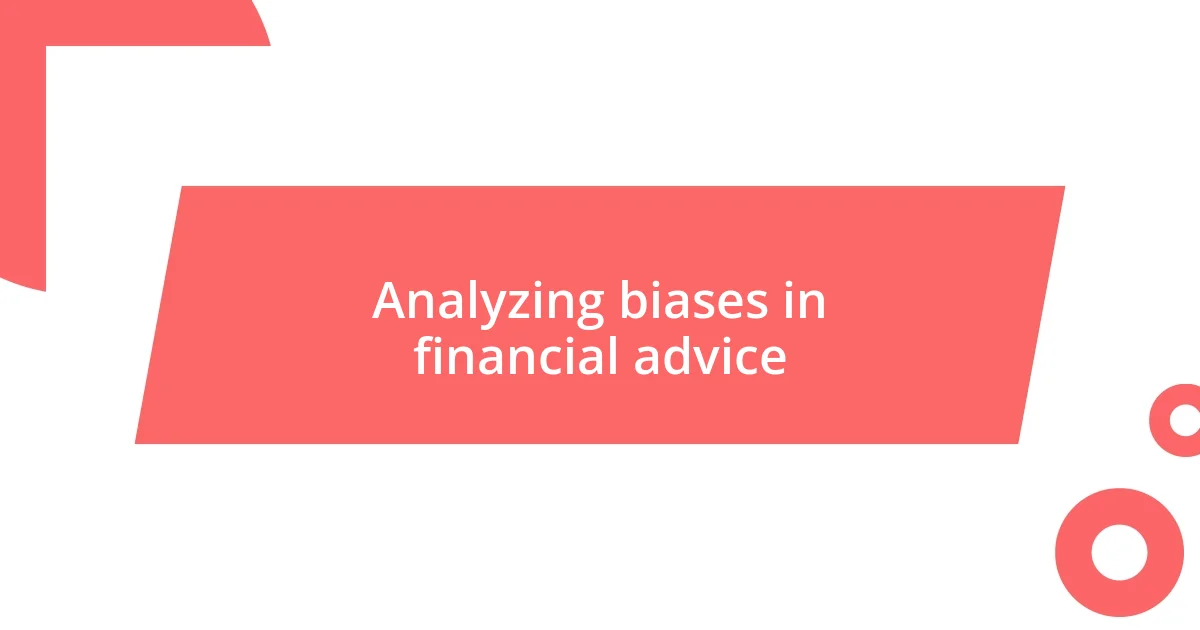
Analyzing biases in financial advice
When analyzing biases in financial advice, it’s essential to recognize how personal experiences shape perspectives. I recall a time when a friend fervently promoted frugality as the only strategy for success. His family had faced financial difficulties, which understandably influenced his viewpoint. But I wondered, what if his experience clouded other opportunities? Sometimes, these biases can lead us to overlook valuable advice simply because we’re stuck in one narrative.
I’ve also noticed that cultural backgrounds significantly affect financial beliefs. During a lively discussion with a group of friends from various ethnic backgrounds, I was struck by how our values influenced our attitudes toward money. While some viewed wealth as a collective resource to share, others saw it as a personal achievement to be fiercely guarded. These differing opinions reminded me that understanding the context of one’s financial philosophy can help unpack biases and reveal the underlying motivations driving those beliefs.
Moreover, I think about the role of media in shaping our financial biases. I used to consume financial news from a handful of popular sources and relied heavily on their guidance. However, after exploring smaller, community-driven platforms, I discovered a wealth of nuanced opinions that often contradicted mainstream narratives. This shift broadened my understanding and made me question—what biases do we unconsciously adopt from our chosen information sources? Engaging with perspectives outside the norm can significantly enhance our financial acumen, opening doors to diverse strategies we never considered before.
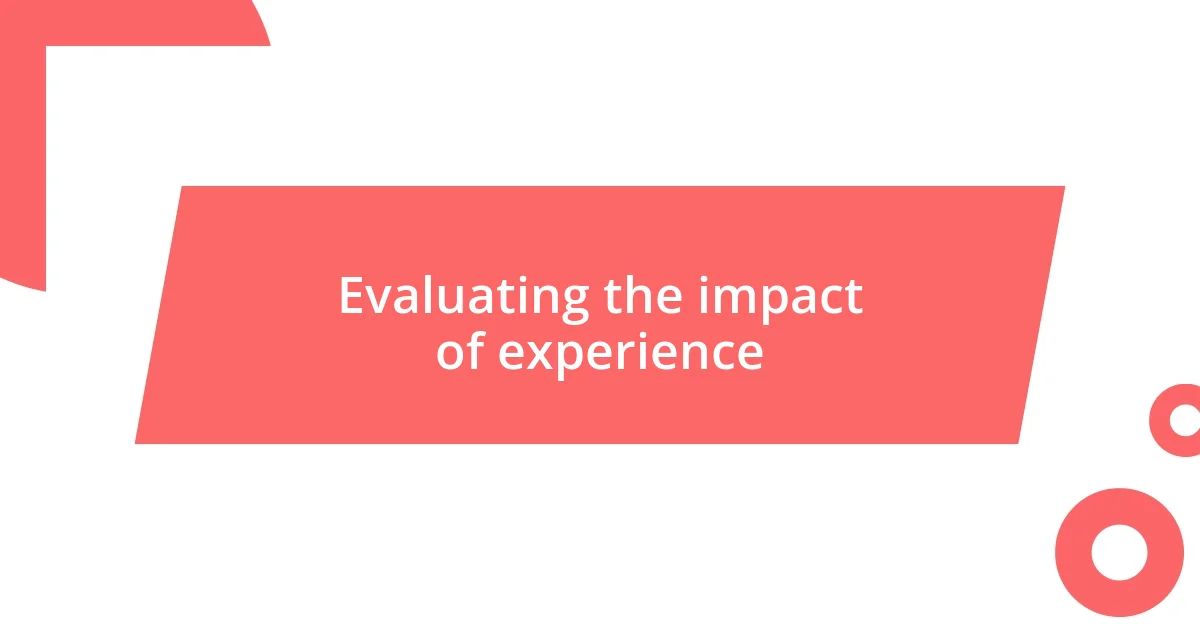
Evaluating the impact of experience
When I reflect on the impact of experience in shaping financial opinions, I often think of my first encounter with investing. I remember being hesitant to take that leap because I’d always been taught to save diligently. But when a mentor shared her story—about how her early investments in index funds changed her financial trajectory—I felt inspired. This made me realize that experience isn’t just about what you know; it’s about how those experiences open your eyes to new possibilities.
Another moment that stands out in my mind involves a family member whose wealth came from a woodworking business. I saw firsthand the risk he took to invest in high-quality tools and materials. In his mind, that was a necessary step towards building something of value, despite the initial financial strain it caused. His journey made me appreciate that experience often teaches us to embrace risk when it aligns with our passions. Isn’t it fascinating how personal stories can challenge conventional wisdom about money?
Finally, I can’t help but ponder the lessons learned from financial setbacks. A few years ago, I ventured into real estate with high hopes. However, market shifts led to unforeseen challenges. While it felt disheartening at first, the experience ultimately shaped my approach to investments. I became more cautious, but also wiser about the need for thorough research and adaptability in my financial decisions. Does anyone else have a story of failure that turned into a pivotal learning moment? Experience, after all, is often the greatest teacher in navigating the complex world of finance.
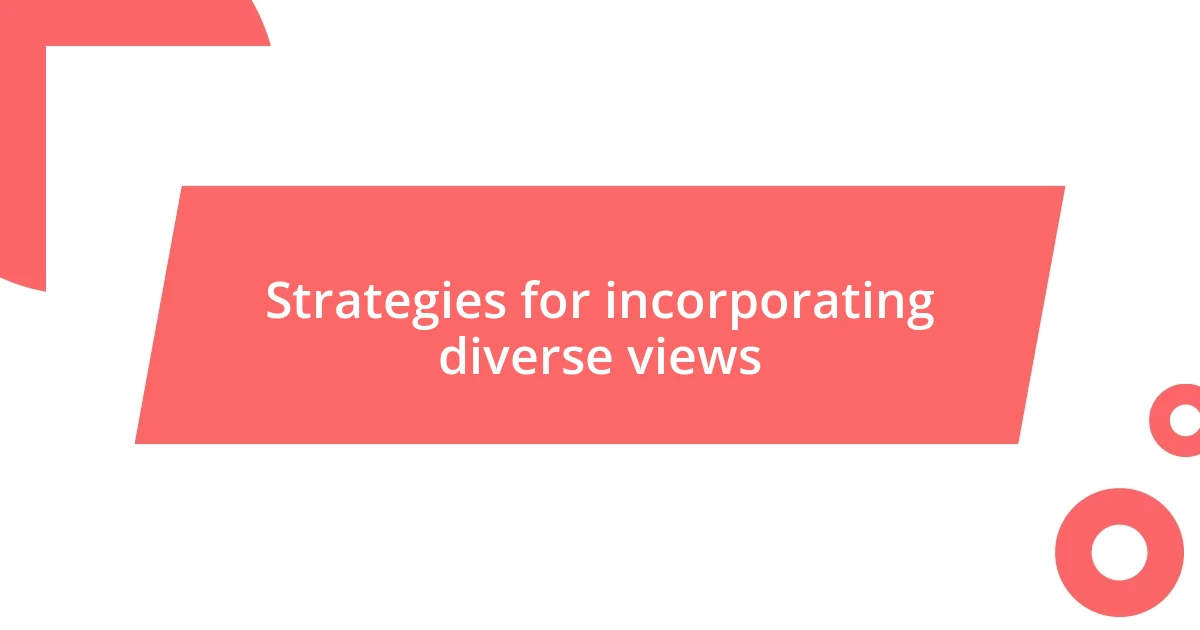
Strategies for incorporating diverse views
When it comes to incorporating diverse views, seeking out conversations with people from various walks of life is incredibly enriching. I remember attending a community workshop where individuals shared their investment strategies. Hearing someone talk about their success with micro-investments opened my eyes to an approach I had never considered. Wouldn’t it be amazing if everyone took the time to share their unique financial journeys, fostering a richer dialogue about money management?
Another effective strategy is to diversify your information sources. I’ve found that mixing traditional financial literature with contemporary blogs offers a refreshing array of perspectives. One day, after reading a personal finance blog written by a single mother, I realized how differently she navigated budgeting compared to what I had read in the more standard guides. Can you imagine the insights we might gain by embracing a broader spectrum of voices in our financial education?
Engaging in forums or discussion groups can be another way to incorporate diverse views. I once participated in an online community where participants pooled their experiences on student debt management. The variety of situations discussed—everything from aggressive pay-down strategies to alternative repayment plans—was eye-opening. It made me question my own approach and consider strategies I’d easily dismissed before. Isn’t it fascinating how collective experiences can lead us to rethink our individual financial practices?
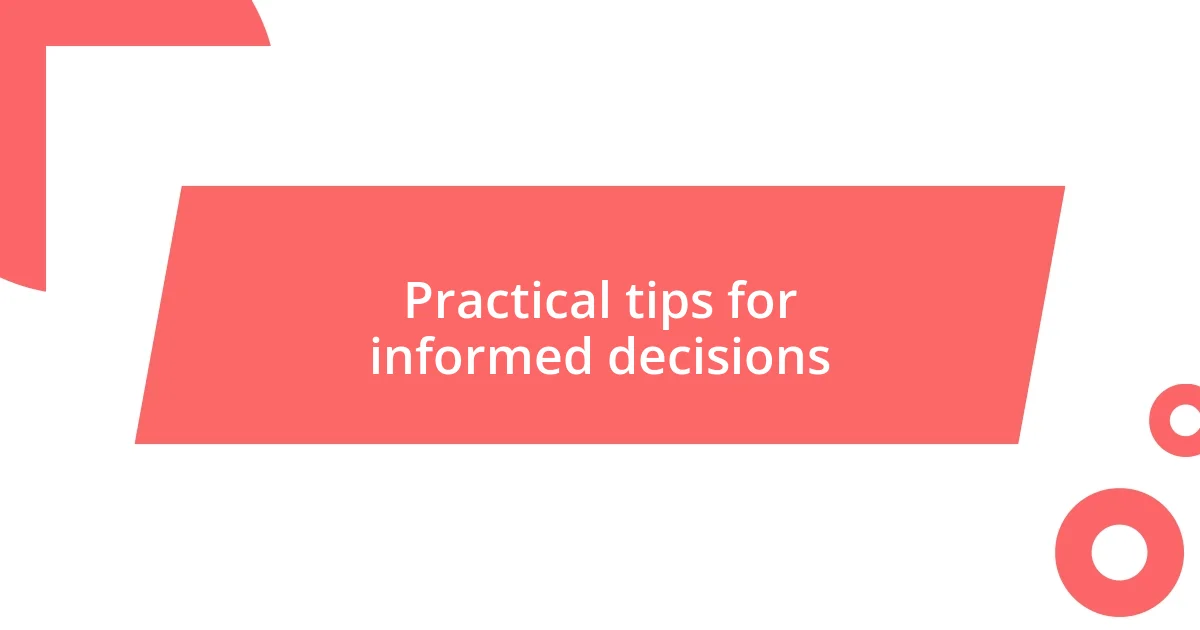
Practical tips for informed decisions
Making informed financial decisions can feel overwhelming at times, but there are practical techniques I’ve found valuable. For instance, breaking down complex topics into manageable pieces helps alleviate confusion. I often tackle one aspect of personal finance at a time, like focusing on budgeting before jumping into investments. Have you ever noticed how much clarity comes from narrowing your focus?
Another tip I’d recommend is to create a decision-making framework. Just last month, I faced a choice between a new investment and saving for unexpected expenses. I laid out the pros and cons, considering my long-term goals and current needs. This visual representation helped me make a choice that felt right for my financial journey. How often do we take the time to weigh our options thoughtfully?
Lastly, I suggest setting a timer for research sessions. I realized the importance of time management when reviewing multiple investment apps in one evening. While it was enlightening, it quickly turned into information overload. Having a set time prevented me from spiraling into a rabbit hole of data, allowing for clearer thinking. Have you ever felt caught in a sea of information? Embracing time limits can enhance our decision-making process significantly.


